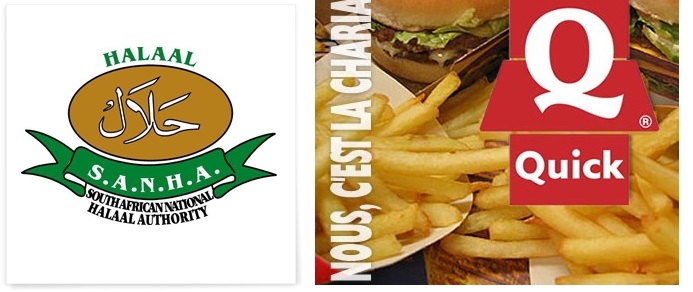The Wahabist-promoting Muslim World League (MWL), requires halaal certification to be carried out by imams pre-certified in the countries-of-origin, which means that companies exporting to Saudi Arabia are paying into the coffers of imams approved by the Wahabists. According to British scholar Alastair Crooke, the terror organisation ISIS is a direct offshoot of Wahabism.
Halaal refers to food products that conform to the dietary laws of Muslim consumers. Anything other than halaal is considered “haram” and prohibited for Muslims. The certification guarantees that nothing in the food has any forbidden components such as blood, pork, alcohol, and the flesh of carnivores or carrion, not to mention coming from an animal which has not been slaughtered in the correct manner, meaning having its throat slit.
Some 60 percent of halaal food in France is controlled by an organisation belonging to the Muslim Brotherhood. Other taxes collected go to Islamic schools and mosques or directly in to the pockets of those who see this as a viable profit making business.
President Trump’s advisers are currently considering an order intended to designate the Muslim Brotherhood as a foreign terrorist organisation, the New York Times reported.
In a 2007 summary for a film Steven Bannon proposed making on radical Islam in America, obtained by The Washington Post, he called the Brotherhood “the foundation of modern terrorism”.
South African Muslim authorities have pointed out, to the dismay of the halaal certification industry, that the Koran forbids imams from charging money to certify food as halaal. Yet, the practice continues with fees charged for halaal “stamps”, in some cases, indirectly propping up various jihadist groups with large sums of ready cash.
In 2010, the second-largest French fast food chain, Quick, began serving halaal-only food in 22 of its restaurants in France. The decision resulted in an outrage across France. Members of the French political left and right criticised the move by claiming that halaal-only Quick restaurants would quickly become safe hangouts for Muslim gangs, including jihadists.
Quick also paid huge certification fees to sell halaal food. In 2015, the American chain Burger King bought Quick and announced that it was not only continuing Quick’s halaal policy but eliminating all pork and bacon products from its 509 restaurants across France, Belgium, and Luxembourg.
According to Australian One Nation party leader Pauline Hanson the estimated worth of halaal accreditation worldwide is in excess of $2.5 trillion per annum. Hanson says the certification is a money making racket. Other products with the certification include food essence, make up and cosmetics, clothing, transport, conveyor belts, cold storage, cleaning products, pet food, holidays, medicine and vitamins. The race is on to establish powerful international pharmaceutical “halaal” brands with an estimated worth of $500 billion per annum.
During an election campaign in Queensland in 2015, Hanson told reporters: “ASIO [Australian Security Intelligence Organization] has picked up that this money has been funded through an organisation to fund Syria and the terrorism there”. ASIO has denied the charge.
Australian icon Cadbury paid to have the Muslim certification on their Easter product range in 2014, even though Easter is a Christian celebration and nothing to do with Islam. It is reported 71 of Cadbury’s products are now halaal certified.
A reported 900 Australian companies have already complied and their numbers are growing.
“This tax is an impost on the Australian consumer, of which 98 percent are non-Muslim. Australians are struggling to meet every day cost of living and should not be forced to pay extra. Another great concern is, that some of the monies indirectly supports terrorism,” says Hanson’s party.
Rachid Bakhalq, the owner of a halal supermarket in Nanterre, a suburb to the north of Paris, says the market is swamped with bogus products.
He told a Muslim blogger “80 percent – most of the halaal products based on meat – are not halaal at all”.
At the wholesale market he attends outside Paris, “there are people there ready to stamp whatever you want halaal simply because they want to have money and they take 15 cents per kilo simply to stamp whatever product you want to be stamped halaal.”
This claim seems to be generally accepted by many Muslims.



No comments.
By submitting a comment you grant Free West Media a perpetual license to reproduce your words and name/web site in attribution. Inappropriate and irrelevant comments will be removed at an admin’s discretion. Your email is used for verification purposes only, it will never be shared.